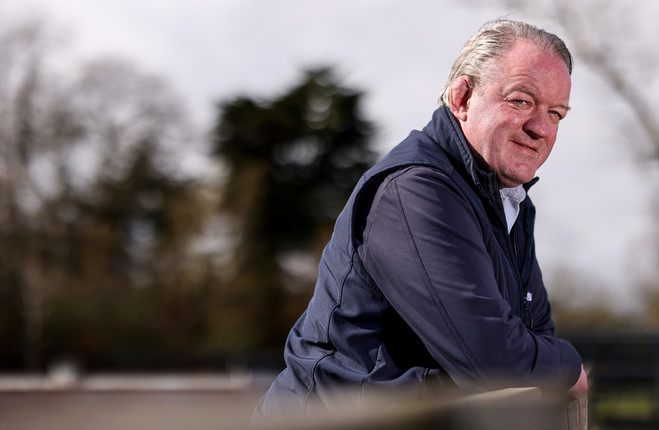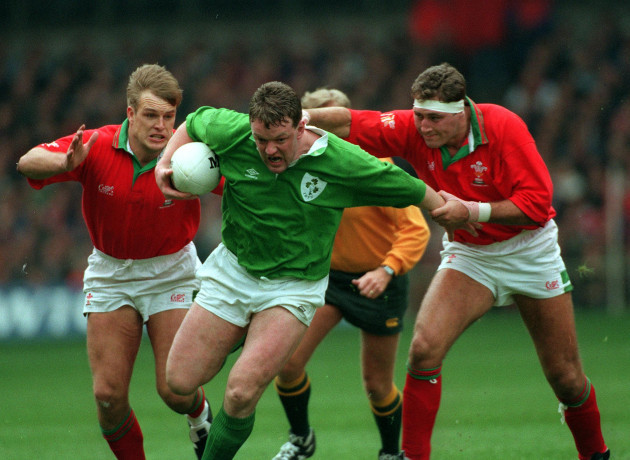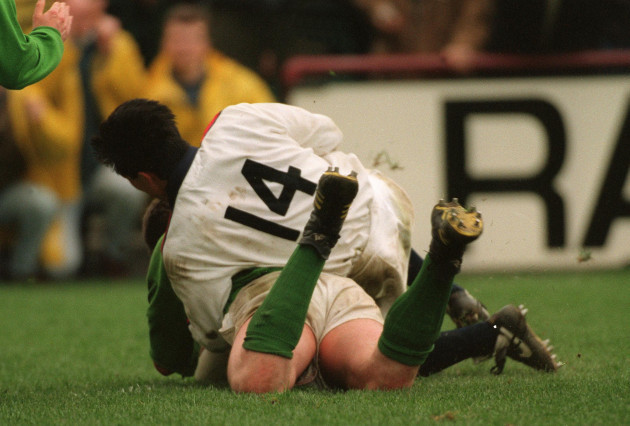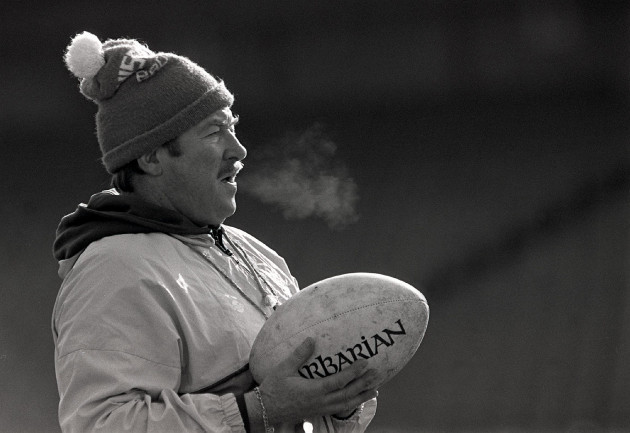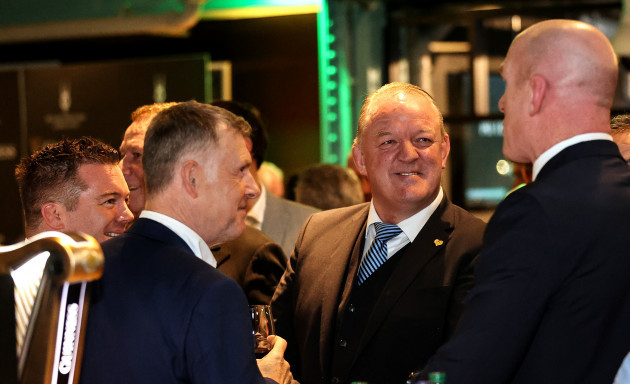THE WAY MICK Galwey tells it with 30 years of practice and polish, the story of his try against England and the famous celebration has never grown old.
As the man himself says, “Scoring a try against England and a bit of drama after it, it always makes for a good story.”
The story that gets fewer retellings is that six weeks earlier as he lay in a hospital bed wearing a neck brace, it looked like Galwey’s rugby career was over before it had ever become the stuff of legend.
“As somebody said, my rugby obituary had already been written in the papers that week. I was finished,” Galwey, then 26, recalls now.
He had 10 caps by that stage but only one win, against Japan, and even then, the Brave Blossoms had taken all the credit for pushing Ireland so close. Among the losses was an embarrassing defeat to Namibia.
He wasn’t picked for Ireland’s Five Nations opener against Scotland in ’93. It was a Lions year and when letters were sent to around 100 players who were considered in contention for selection, nobody was looking for Galwey’s address.
Ireland’s 15-3 defeat to the Scots opened the door for his international recall but when Galwey showed up for a squad session the day after an All-Ireland League match for Shannon, he complained of stiffness in his neck. Team doctor Mick Molloy dispatched him to St Vincent’s as a precaution.
It was the start of a week-long ordeal.
“They spotted something in the X-ray so they put me into a brace and they kept me there overnight.
“I remember meeting a Dr O’Rourke, I think he was Colm O’Rourke’s brother, and the X-ray didn’t look good.
“I’ll never forget, I spent the week in hospital in a brace. MRI was just out at the time so I got an MRI and it was literally the Friday morning I got the all-clear.
“They told me there was something in my neck, yes, but it was there from birth and it wasn’t an issue.
“I played a match again on the Saturday and then the next few weeks were a whirlwind.
“It all went from looking like a very bad story to a dream come true.”
He was straight back into the team for a 21-6 loss against France before they beat Wales away to snap an 11-game losing streak with debutant Eric Elwood kicking 14 points.
An England team needing to spank Ireland at Lansdowne Road to retain their championship didn’t appear likely to provide a happy hunting ground.
The Red Rose had rumbled to back-to-back Grand Slams as Ireland failed to win a single match in back-to-back championships. They were Rugby World Cup runners-up. They won every game they played in 1992. They had beaten Ireland six times in a row in which time Ireland had scored a mere 32 points to England’s 149.
“It’s hard to believe it’s 30 years and yet, it only feels like it was yesterday,” says Galwey. “It’s a sweet memory and in those early days, particularly with Ireland, there wasn’t too many sweet memories.
“You dream of playing in Lansdowne Road and you dream of winning in Lansdowne Road but that really wasn’t happening.”
Despite the form book, Ireland believed they could derail the sweet chariot.
Galwey runs through the team and coaching staff one by one before concluding: “It wasn’t a fluke that we beat England because our team was good. We’d a good work ethic and a lovely close-knit squad and management. That can never be underestimated.”
Ireland played at a high tempo, using Jack Charlton’s popular refrain, ‘put them under pressure’. Elwood kicked two penalties and two drop goals as Ireland seized a 12-3 lead.
England were there for the taking and Galwey finished them off, carrying Tony Underwood over the line on his back.
“I knew there was someone hanging out of me, I didn’t know who, but as it turned out, it was one of the smallest English fellas but that didn’t matter.
“Just to win in Lansdowne Road and to win in front of your home crowd and I know people don’t like it now or it doesn’t happen anymore, but to feel the crowd coming on and patting you on the back, it was a great moment.
“It was a moment I cherish. I’m not saying it changed my life but that moment and that try put me out there.”
It was a fitting score in two ways. First, parochial: “That was the Currow corner because Mick Doyle and Moss Keane had scored in that corner as well so it was fitting I got it there.”
Second, familial: As the crowd rushed in, last among them was a woman in a bright yellow jumper. It was Galwey’s sister, Mary.
If you’d have thought Galwey would’ve got her a better seat in the ground, you’d be right.
“She’s still embarrassed over that but it’s a great family story at this stage, an amazing story.
“There was no Ticketmaster or nothing where you could transfer tickets by phone back then. I physically left a ticket for her in an envelope at the reception of the Berkeley Court and sure look, maybe somebody saw Galwey and they took their chances.
“She got there and the ticket wasn’t there. And she’d flown in from New York that morning which was the big thing.
“I’ve never met them, and maybe this might remind them in case they’re still with us, but somebody gave her a ticket at face value. It was like it was meant to happen. There she was below in the very corner where I scored.
“She was very embarrassed over it but you know what, I wouldn’t change a thing. It was one of those beautiful moments and would you believe, I didn’t see her again for probably three months because of the hassle that night and she was heading back to the States and she didn’t have a mobile phone at the time.
“I didn’t lay eyes on her again until she came home for my wedding the following August bank holiday weekend.”
One of the duties that night, away from the crowds and chaos at the Berkeley Court, was a trip to meet Gay Byrne on The Late Late Show, back when it aired on Saturday nights.
“I remember [manager] Noel Murphy coming in and he looked around and there were fellas drinking pints and they were drinking champagne and for some reason, he looked at myself and Terry Kingston and we probably looked the soberest at the time so we were the two picked out.”
Maybe it was the adrenaline rush from scoring his first international try that was keeping him going. Or maybe it was meeting so many of his family and friends across the night, Kerry legends Doyle, Keane, and Con Houlihan among them.
Doyle wrote in the following day’s Sunday Independent: “Michael Galwey is the man I always thought him to be — I admit I am biased but I am also right. He is the keystone of this Irish pack — that inspirational tower of strength and ability which lit a fire in Cardiff. His physical strength, skill, and rugby brain proclaims him as one of our greatest ever players, and I am not bullshitting.”
“Well, I suppose the one the one thing you’d take out is yeah, he was biased,” laughs Galwey in response 30 years later, before turning serious.
“When somebody like Mick Doyle says that about you, it doesn’t come from anybody better because here’s a man who pushed Ireland to win Triple Crowns.
“High praise indeed but Mick Doyle always had my back, I don’t think he ever said a bad thing about me, a bit like Con Houlihan and Moss Keane for that matter.
“As Con Houlihan would say, Mick Doyle was looking after a neighbour’s child when he was saying that but at the same time, it meant a lot to me.”
In little over a month, Galwey had gone from outside the top 100 to be named on the Lions squad to tour New Zealand the following Monday. He was one of only two Irish representatives alongside Nick Popplewell (Vince Cunningham and Richard Wallace would later be called up as replacements). The Independent labelled it a ‘lunatic Lions selection’.
The Irish selector for the tour, Ken Reid, was accused of ignoring Ireland’s victory. “I can say categorically that is not true,” he hit back. “In fact, you can take it from me that Mick Galwey got in on the basis of Saturday’s game.”
“I didn’t get that letter at the start of the year but I suppose I got the most important call of all,” Galwey reflects.
The celebratory homecoming back in Currow had to wait a week. That evening, he was on a flight to represent his country at the Hong Kong Sevens. A month later, he was on the Ireland team that reached the Rugby World Cup Sevens semi-finals.
Times have changed utterly as Ireland, 30 years and a switch to professional rugby later, can now expect to shoulder the favourite’s tag against England.
Back in ’93, that all seemed a long way away but the Lansdowne Road breakthrough was a vital lift for Irish rugby.
“It was one of those great moments that we were able to enjoy,” reflects Galwey.
“We were never lucky enough to win Triple Crowns or Grand Slams or Championships or anything like that but our highlights were we played England a few times and beating them at home in ’93 was huge.
“We had won nothing but we felt we had achieved something and I think we did because you wouldn’t be ringing me today 30 years later unless there was something good out of it!”
The public haven’t stopped asking about that try either. He was over in Washington DC last week watching Ireland beat Scotland in a friend’s Irish pub and fielding questions at a meet and greet event.
“A few people have said it to me already that it’ll be 30 years and funny enough, there’s still fellas buying me pints 30 years later which is the best thing,” he says with a hearty laugh.
“It’s true. People often come up to me and the conversation doesn’t pass by [without mentioning] ‘I remember the day you got that try against England’.
“That’s sweet, it’s nice to hear, but there’s nobody young saying it to me anymore… They’re all old lads like myself!”
